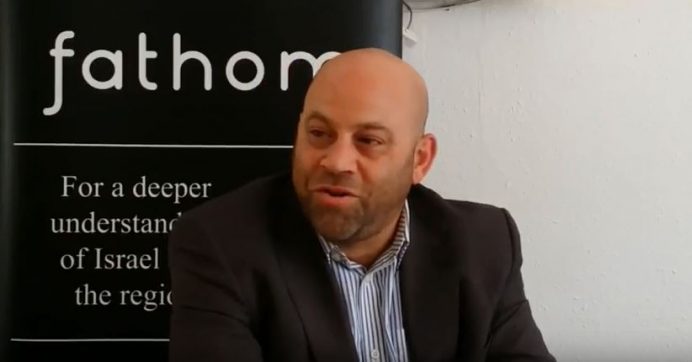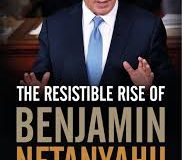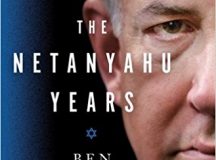Anshel Pfeffer is the author of a major new biography of Israeli Prime Minister Benjamin Netanyahu. In this wide-ranging discussion at a recent Fathom Forum in London Pfeffer talked candidly about his book and its subject. He claims that Netanyahu’s sustained dominance of Israeli politics is no interlude after which normal Labour Zionist service will be resumed. Bibi, says Pfeffer, is ‘Israeli through and through, and in order to understand what makes Israel tick today you must understand Netanyahu’. Below is an edited transcript.
Question: What distinguishes your biography of Benjamin Netanyahu from the others that have been published in the last few years?
Anshel Pfeffer: I started working on the book about three years ago. My greatest challenge was working out how to package his long and intense public career into a 400-page book. The solution I came up with, after a few false starts, was to tell the story of Israel through the lives of Netanyahu (Bibi) and his family. He was born about 16 months after the establishment of Israel and his life has run parallel to the history of the state. And he has spent the large majority of his life in public service: first in the army as a solider and officer, and then – after a short period as a student and working in the private sector – in the diplomatic corps as a deputy ambassador to the UN, before moving into politics, where he has remained for the last 30 years.
Mine is the story of Israel through the eyes of the ideology and the party which is the power in Israel today and which Netanyahu leads. Almost all the books about Israel’s history are written from the perspective of the founding generation of Labour Zionists David Ben-Gurion, Golda Meir, and Moshe Dayan. That made sense because those people built the state and they were part of the Zionist movement before the establishment of Israel. But Likud and its ideological fathers, Herut and before that the Revisionist Party, were also always a part of Zionism and the State of Israel and it is they who have been in power now for the last three decades (with a few very short intervals).
We still tend to see the revisionists as an aberration – ‘Israel has gone off course and is now in an atypical period and sooner or later Israel should go back to what it’s always been’ – and we are still waiting for the next generation of Zionist leaders like Peres and Rabin to come along to ‘put Israel back to where it should be’. Obviously, that is a fallacy. Israel is a democracy and for most of the last four decades it’s been dominated by the group represented by Netanyahu.
I wanted the book to be the story of how these outsiders became the insiders. Ze’ev Jabotinksy was the founding father of the ideology of revisionist Zionism, always the outsider to mainstream or Labour Zionism, Ben-Gurion’s main rival, and he died in 1940. Eventually, Menachem Begin emerged as the new leader of Likud. In many ways Netanyahu is the third generation leader of Likud. (Sharon was never a true revisionist but really a Labour Zionist who went to the Right to join Likud and then almost destroyed the party when he split it to form Kadima.) While Labour Zionism has had seven or eight leaders in the last 19 years, Revisionism has only had three big leaders in its entire history. The Likud has been a very stable movement, loyal to its founders and supporter base.
The other thing that people tend to say about Bibi is that he’s half-American; not entirely Israeli but partly foreign, as if ‘made’ in the US and then grafted into the Israeli body politic. In the book I try to prove that this is an illusion. Yes, Netanyahu spent most of his 20s and 30s in the US, first as a student and then at the UN, but what Netanyahu brought from the US back to Israel was his presentational skills, his appearance and his grasp of the power of TV. Look beneath the polished exterior and the fluid American-English delivery and you find an Israeli ideologue and a Jewish nationalist. Those are the deep parts of his personality and what motivates him as a politician. He’s not half-American; he’s Israel through and through, and in order to understand what makes Israel tick today you must understand who Netanyahu is and how he became the man he is.
The book shows how Bibi changed the Likud. When Netanyahu entered politics the Likud was still the party of Begin, who was living as a hermit in Jerusalem. The party was called the ‘fighting family’. It had been joined by a younger generation, mainly Mizrahi, who didn’t find their place in the mainstream. That was the party Begin built and which brought him to power in 1977. When Bibi came along, those were the first people he had to charm. In the 1988 Knesset primaries he got to the top of the list by appealing to this group. After Shamir resigned in 1992-3 the party had a big membership drive and held its first open primaries. Bibi managed to sign up tens of thousands of people, making the Likud a mass party. But over time he has made it a mass party of a certain type. While the Likud used to be a grassroots party, with branches in every village and town in Israel, today most of those branches only exist on paper. It’s no longer a party that has a ‘party life’ such as would be recognisable here in the UK. Instead, the Likud has become more like the US Republican Party, which serves as a platform for its leader to get into the White House. That’s how Bibi sees the Likud – not as a place to have ideological discussions but as a mechanism to run his elections. There is no ‘Likud family’ today. In fact, when you meet people who are real Likudniks – whose fathers and grandfathers were Likud members 50 or 60 years ago – they feel Bibi has taken the party away from them. They won’t betray him because he is an election winner. Likud and the Revisionist movement do not throw out their leaders very often. They usually stay at the top until their die or resign as Begin did.
What Bibi is really worried about is the much larger non-Likud voter base. Likud gets around 25 per cent of the national vote, and with Israel having a proportional representative system the winning party has to lead a coalition to form a majority in the Knesset. Bibi worries that the right-wing base will turn against him, not necessarily because of the current investigations as such, but because those investigations may make him no longer seem an electoral winner.
This worry drives much that Bibi does. For example, a month ago, in the middle of Pesach, he announced that the government plan to deport immigrants had failed, so he had agreed with the UN to deport a third and allow another 20,000 long-term residency in Israel. However, in the face of a backlash from his base he backtracked a few hours later. He hasn’t lost their support yet, but he knows that if he alienates the far-Right, racist group that represents the very core of his support base, he will not be able to maintain that 25 per cent threshold he needs to form and lead a coalition.
Question: Do you think that worry explains his Iranian policy?
AP: Bibi sees Iran as Israel’s greatest threat, not the Palestinians and not any problems in Israeli society. This ‘external preference’ has been with Bibi from an early age, when he saw the Soviet Union and radical Arab terrorist groups as Israel’s greatest threat. He has been talking about the Iranian threat since the beginning of his diplomatic career; he often refers to his time at the UN when Israel was being called ‘the cancerous tumour’ by Iranian officials. He sees Iran in the terms set by his broader worldview that sees Israel and the Jews as facing a global-sized threat from countries and ideologies. When Bibi talks about Iran, he often talks about its world ambitions. This might sound ridiculous, but it’s part of the way he sees things – that there are powers fighting for the domination of the world, and the Jews of Israel are at the forefront of Western values and the Western community and they’re the ones taking most of the flack.
Question: Is the pendulum in Israel ever going to swing back to the left? Perhaps the 2015 election was evidence that it won’t any time soon? If it doesn’t how does Israel look in 10 years time?
AP: I think the pendulum will swing back but the Likud is not an aberration, in fact it is part of what Israel actually is. If you look at the election results during the Netanyahu years, the actually size of the right-wing bloc of religious parties and right-wing parties has been constant: around 51 or 52 per cent of the electorate. When Rabin won the election in 1992, that number was the same, but one of the right-wing parties split and were unable to pass the threshold to enter Parliament. Kadima’s success in 2006 tells us that most Israelis are centrists but there really hasn’t been a strong centrist leader. Bibi is entrenched because he knows how to play the system; he’s been an excellent coalition builder, he knows how to divide and rule.
On some issues, Israel has gone to the Left. Thirty years ago maybe a third of Israelis were prepared to accept a Palestinian state. Today that number is more like 60 per cent. But party politics is much more about personalities and power politics, and Bibi is the master there. He’s lasted longer than anyone else of his generation and everyone now in Israeli politics, with the exception of two or three veterans who are not seen as potential future prime ministers, are at least 10 to 15 years younger than Bibi. One of his supporters said it best recently: ‘It’s Netanyahu and the seven dwarfs’. When you look as resume and his skills he is head and shoulders above anyone else.
How Israel looks in 10 years depends on when Bibi leaves, whether he is forced out by indictment or loses an election, and who is best positioned to become prime minister when he leaves. No one thought Ehud Olmert would be Prime Minister but he happened to be best positioned when Ariel Sharon had his second stroke. The best positioned person will be the next prime minister of Israel, it could be one of 10-15 people and it could happen in two months or in four years.
Question: How many of the changes in Israeli society that we have seen during Netanyahu’s time are now entrenched?
AP: One of things that worries me as an Israeli and British citizen is the question, ‘Is Israel becoming more racist?’ It’s an issue for many Western countries, and is coming to the surface much more because of Twitter and Facebook. All over, people are asking themselves ‘Are we this bad? Have we always been this bad?’ We are asking ourselves this in Israel. Dan Meridor, who’s been an internal rival of Bibi for many years in Likud, said to me when I was working on the book, ‘Bibi is no racist, but he has no problem using the racism which exists.’ Netanyahu could be much more characterised as an elitist than a racist, but to use racism for political purposes is to cooperate in bringing it to the surface and that’s what he has done.
I wouldn’t describe this development as ‘entrenched’. There are counter trends, such as much greater acceptance of gay people and more acceptance of Israeli Arabs in more spheres of Israeli society today than ever. You don’t see that in politics because politics has become much more polarised, but you do see it in business, commerce, education and so on.
Question: Can you explain Bibi’s personal animosity to Mahmoud Abbas [Abu Mazen]?
AP: Bibi has antipathy to the Palestinians in general. He doesn’t see why Israel should waste time on the Palestinians rather than spend time on the big things, the things a superpower should focus on, like Iran, like the big geopolitical issues. The Palestinians to him are similar to what they were to Golda Meir; they don’t exist, although he would never say so. He believes they’re a minor branch of the wider Arab world, and are being used by that Arab world to avoid making peace in the region. Abu Mazen represents that nuisance. I don’t think it’s personal; he just doesn’t want to focus on the issue.
Question: So what’s his private vision of the conflict?
AP: Bibi’s vision is not private. If you read the book he wrote 25 years ago [A Durable Peace: Israel and its Place Among the Nations] you will find it set out. He says very clearly that the Palestinians will eventually agree to live in autonomous regions. Today he calls it a ‘state-minus’. But whatever label you use, the vision is of autonomous enclaves in parts of the West Bank and Gaza Strip. Eventually, he thinks, the Palestinians will have no support, will get tired, and will accept that solution. He is more than happy to wait 20, 30 or another 50 years until they do. He doesn’t really think there is any prospect of reaching a two-state solution. When he said ‘Palestinian state’ in his Bar-Ilan speech in 2009, and afterwards in his second US Congress speech, look at the small print and you’ll see he wasn’t really offering them a state. He was basically under pressure from US President Obama.
Question: When you look at the demographics of Israel today, the ultra-Orthodox camp is very substantial and wields a lot of political power. Is that fact going to seal the deal for the Right in the next 20 to 30 years?
AP: Even if the percentage of the ultra-Orthodox in the population has grown from 5 per cent to around 10 per cent of the total population, the UTJ still has only six MKs, while Shas is down to four MKs, making Bibi worried that they won’t even get into the next Knesset. He is trying to lower the threshold, which is ironic because the threshold was raised to try and block the Arab parties. So the demographic growth of the ultra-Orthodox hasn’t affected their political weight.
Also, their birth rate is actually decreasing, so they won’t grow exponentially, as before. They’re getting married later than they used to, and a lot of the younger generation are more outward-looking; for example they have two phones – one Kosher where you can’t watch films or surf the internet, and a secret smart phone they hide in their jackets. The Rabbis prevented televisions getting into their houses 40 years ago, but they are unable to stop it now. It’ll be the same with phones. And finally, more and more of the younger generation are voting the way they want to vote.
I really wouldn’t predict the Likud-religious alliance surviving the Netanyahu era. Whatever happens after Bibi, all these alliances will be revisited, because they are all based on one person, Bibi, the one who sits down with Shas leader Deri or the Ashkenazi rabbis. Sure the next Likud leader will try to do it, but the understandings and codes which underpin the alliance will be gone.
Question: You said that Netanyahu is prepared to live without a solution to the conflict, but can Israelis live without a solution to the conflict?
AP: If we were having this conversation 20 or 30 years ago the same question would’ve been asked. At every anniversary of the occupation we hear ‘it’s not sustainable’. Well, after 51 years it seems eminently sustainable. I’d argue it’s bad for Israel, as is it is for the Palestinians, but people like Bibi feel we can continue living with it. What he has proven is that unless there are really compelling photographs of people storming the fence and being killed, the world just doesn’t seem to care that much anymore. This week was the first time Palestinians were in the headlines for a long time. The Palestinian cause is now the cause of students, the Guardian, the New York Times. The EU will talk about it a bit, but the big effort of the EU is no longer there. As an Israeli who cares about the state, I want the conflict to be solved as quickly as possible. But in contrast to previous decades, it isn’t currently an international issue, nor will it be for a long time.
Question: Is Bibi going to survive the current investigation?
AP: He’ll survive the investigation but the real question is whether he’ll survive the indictments. Bibi appointed the head of police from the Shin Bet thinking he would only be interested in counter-terrorism. But Roni Alsheikh is a right-wing settler, and a forensic investigator and entered the job with the same zeal he operated with over the last 15 years in uncovering the Hamas network of the West Bank. He’s found a way of convincing three of Bibi’s closest confidants to turn state’s witness.
The files are thick but there is no evidence of cash changing hands. Whether anyone can establish a criminal case based on the claim that the decisions Netanyahu made benefited certain companies in return for favourable coverage, and that this constitutes bribery, is not clear. You could say the same about Murdoch in this country and whoever has been PM over the last 30 years.
So the real question is whether the Attorney General will decide to indict, and that may depend on whether anyone will actually come out against the prime minister and say that what he did was a breach of trust and clear bribery. If he is indicted, Bibi says he will remain in power. There is no clear law on whether or not the prime minister must resign if indicted, though there is precedent that regular ministers can’t stay. There is an argument that if the prime minister leaves the government, it falls, and we need to have elections. So we could have a situation in which legal officials can bring down the government. But this has never been tested, because in the two cases where prime ministers were close to being indicted, Rabin and Olmert, they both resigned in advance.
Bibi’s case is different to the corruption we saw with Sharon and Olmert, both of whom amassed massive riches during their time in power. The largest private farm in Israel is owned by the Sharon family, and Olmert at the time was allowed to have a second job though his law firm. Despite the short time Netanyahu did work in the private sector after he lost the 1999 election – during which time he mainly spent working to buy his villa in Caesarea – he hasn’t built up his wealth in the same way. His corruption is innocent in the sense that he believes it is ok for him and his wife to receive gifts like champagne and cigars because, as his wife has said, if he wasn’t a politician he’d be making billions. Unlike Olmert, who was lying to us the whole time, when Bibi says nothing happened, he truly believes nothing happened.
I think it will ultimately bring him down.
Question: There is a new phenomenon in the world – antisemitic support for Israel – and Bibi seems not to have opposed this properly. For example, Bibi gave support to the Hungarian government after its antisemitic campaign against George Soros. I accept your argument that Bibi is an authentic part of Israel (despite his Americanisation of politics) but there seems to be some degeneration of the true meaning of Zionism here. The state was made to defend Jews against antisemitism, but in the face of this new phenomenon, Bibi does not always perform that function.
AP: Bibi would certainly answer ‘yes’ to the question, ‘Is the role of the State of Israel to protect the Jews of the world?’ If you were to ask him how best to protect the Jews, he would say migrate to Israel. Other prime ministers would have said that Israel has an obligation to Jews living abroad. In private meetings Bibi doesn’t believe that many of the American Jews will remain Jewish or that there will be a viable Jewish community in America in a couple of generations. He thinks in two generations what will remain of the five or six million Jews of the US will be the religious Jews, i.e. about 10 to 15 per cent of the exiting US Jewish community.
Bibi is a Jewish nationalist but he sees everything in the terms of what is best for Israel. If, for example, Hungary’s Victor Orban is pro-Israel and the head of a government which is a member of the EU, and any EU nation can block a condemnation of Israel by the EU; Victor Orban is very useful. It doesn’t matter that Orban has been running an antisemitic campaign to get elected. It doesn’t even matter that the Hungarian Jewish community has appealed repeatedly to Israel to condemn it. When Israel’s ambassador to Hungary issued a condemnation, Orban called Bibi and Bibi ordered the ambassador to rescind the statement.
Netanyahu has made a conscious decision that ‘what is good for Israel is good for the Jews, and if the Jews in the world don’t care then that’s their problem. I’m not going to try and convince them.’ You imply it is a degeneration; it’s not, it’s a conscious decision that ’what is good for Israel is what is good for Jews around the world.’ When he made his famous visit to Congress in 2015 he defied not just the President of the US but also the man who had received the most Jewish votes in history. Barack Obama could claim to be the most popular Jewish politician ever, much more than Netanyahu. Three times as many Jews voted for Obama as Bibi. But Bibi went there and said ‘I represent all Jews’: that’s how he sees it.
Question: A new film about Entebbe has been released. Can you talk about how the raid, in which his brother Yoni died, helped to form Bibi?
AP: Yoni was not just his brother but also the closest person to him. Yoni’s influence is about more than Entebbe. Crucially, Yoni was Bibi’s trailblazer. Yoni’s decision not to stay in the US, but to go back to Israel and into the Army, a decision Bibi also took, was critical. You see, Benzion, their father, was a staunch revisionist Zionist, but he didn’t understand (and we’re talking about the early 1960s), how central the IDF had become to Israel’s life. He came of age before the state and he was an ideologue who thought that political ideologues were above the army in importance.
Benzion moved to the US after not being able to get an academic job in Israel and he worked as editor of Encyclopaedia [Hebraica]. He thought that his sons should stay in the US, go to Ivy League Colleges, get the best education possible and become intellectuals. He didn’t see any use in them going back to the army. Of course he was in favour of Israel having an army, but he didn’t think that this was the best use of his sons’ time. He thought the people who went to the army were not the elite, certainly not the intellectual elite. And he pushed them both during their last year of high school in the US to apply to all the popular universities. Yoni was accepted to Harvard, Bibi was accepted to Yale. He expected them to remain in the US and go to those places. Instead they both left the minute they finished high school and headed back to Israel on their own.
At least some of Bibi’s trips back to Israel as a teenager were paid for by himself. He has talked about how he washed dishes and waited tables in restaurants to make the money for the airfare. And they lived in Israel on their own, went to the toughest units, while their parents didn’t even visit Israel for two or three years at a time. In ideological terms, Bibi is Benzion’s successor, but he rebelled against his father by going to the army.
Yoni did it before Bibi; he was the trailblazer. Bibi followed Yoni’s example. And Bibi was much more successful in America than Yoni. His brother always kept his accent but Bibi managed to kick his and sound American, at least for outward purposes. Yoni served as Bibi’s example in rejecting those soft, contemptuous Jews who will never go to the army, who will never serve their state, who will never be the one to take new risks and remember who we are. Bibi was 13 when he arrived in America. Like many Israelis at that age who move to a new country, he could have assimilated himself into the local culture. Yoni was the one who kept him true to their Israeli identity. So that’s the main influence that Yoni had over Bibi.
Yoni’s death, besides being a personal blow, was also Bibi’s opportunity in the sense that there was no one there to speak for the Entebbe operation. Yoni was the hero because he was the only one who died, but Yoni was a member, as Bibi would become too, of a unit whose existence wasn’t acknowledged by the Israeli government until 1993. So, whenever the media talked about Entebbe it was always ‘Special Paratroopers’ and a ‘Special Unit’. The unit was never named, the members were never named and the only reason that Yoni could be named was because he was dead. None of the officers who had been on the operation gave an interview with their faces and their names for years. Nowadays we see it all, because it was 40 years ago. But for the first decade or so after Entebbe, none of the people who had actually been involved could be named, besides Yoni himself.
Bibi became Yoni’s stand-in, because he was the family’s spokesperson and because he had been in the same army unit.
It was then Defence Minister Shimon Peres who gave Bibi his first leg up, by endorsing the family, by helping them set up their think tank, the Jonathan Institution, and by allowing Bibi to become ambassador to the UN in 1984 at the age of 33. Peres didn’t realise then how much of a Likudnik Bibi really was and that less than 10 years later Bibi would become his nemesis.
Question: Does Bibi think of succession planning? Gideon Saar has been around for many years as a potential heir. Also, what do you think Bibi wants his legacy to be?
AP: In 14 months, if he holds on, Bibi will become the longest serving prime minister, surpassing Ben-Gurion’s record. If he wins one more next election he’ll equal Ben-Gurion’s five election wins too. There isn’t a succession plan because he doesn’t see anyone worthy of succeeding him. He has no plan to leave the prime minister’s office; the only place he’s prepared to go to from the prime minister’s office is the presidency, and then only if he is able to change the law to make the president’s powers much stronger and have the prime minister be an extension of the presidency.
He certainly thinks a lot about what historians may say about him. He hasn’t said it in words, at least not to my knowledge, but after observing and researching him I think what he wants history to say about him is that he was the man who ensured Israel’s survival. At a more concrete level I think he wants what we are starting to see today, much more open relations with the Saudis, Egyptians and other Arab Gulf states, who will agree to accept Israel in the region despite the Palestinian issue. And he wants to see the Palestinians give up with their demands for an independent state. Those are his policy goals and he believes Israel can accomplish them if Israel stands strong. He believes in peace through deterrence; people will come to Israel’s terms and not the other way round.
Question: What is Bibi’s global standing?
AP: Last Tuesday, the US president endorsed Bibi’s doctrine; not just this or that position, but Bibi’s entire doctrine as official US foreign policy. By Wednesday Bibi was guest of honour at Russia’s Victory Day parade, its largest parade of the year, standing next to Putin. By Wednesday night, the IDF attacked in Syrian Russian-made anti-aircraft missiles, and the Russians said nothing. Not bad for two days for a country of only eight million people. I’m not saying this out of admiration, but that’s Bibi’s standing right now. He’s been hosted by every major world leader, and with the exception of Angela Merkel, everyone wants to be seen as Bibi’s friend. These are pragmatic people who see Bibi as an election winner, they see Israel’s successes, they no longer see the Palestinians as a deal-breaker for improving Israeli ties, and they see the Iran deal being stuck due to Bibi.
Bibi doesn’t see the Diaspora as a powerful ally for Israel. With Trump in the White House surrounded by Evangelicals and hawks like US Secretary of State Mike Pompeo and National Security Advisor John Bolton, Bibi doesn’t think he needs American Jews for their political support either. Instead, he wants to be an ally of every strong leader who can help his policies.




































